Why Does Apple Cider Vinegar Help with Acid Reflux?

Apple cider vinegar (ACV) helps with acid reflux primarily because it can improve stomach acidity and support the function of the sphincter valve that prevents acid from rising into the esophagus. Research and anecdotal reports suggest that low stomach acid may weaken the sphincter valve, leading to acid reflux. ACV, being acidic, appears to restore proper acidity levels, signaling the valve to close and reducing symptoms of reflux.
Understanding the Role of the Sphincter Valve
The lower esophageal sphincter (LES) acts as a gate between the stomach and the esophagus. Its job is to keep stomach contents, including acid, from flowing back up into the esophagus—this backflow is known as acid reflux.
- Normally, the LES stays closed due to the presence of acid in the stomach.
- If stomach acid is too low, the LES may not close properly.
- Low acidity can occur from excessive use of antacids or acid blockers.
Apple cider vinegar adds acid back into the stomach, which can help trigger the sphincter valve to close properly. This reduces the chance of acid leaking upward and causing reflux.
Impact of Stomach Acidity and Buffering Effects
Antacids like calcium carbonate work by neutralizing stomach acid, raising the pH temporarily. This offers short-term relief but prompts the stomach to produce more acid later — a rebound effect.
By contrast, ACV is a weak acid (acetic acid). When consumed, it can create a buffer system in the stomach. This buffer involves acetic acid and its conjugate base, acetate. The system helps stabilize stomach acidity around normal levels.
| Substance | Role | Effect on Stomach pH |
|---|---|---|
| Calcium Carbonate (Antacid) | Neutralizes acid temporarily | Raises pH; triggers rebound acid production |
| Apple Cider Vinegar (Acetic Acid) | Supplemental acid; forms buffer system with acetate | Supports normal acidity; stabilizes pH |
Interestingly, ACV and other acidic substances like lemon juice turn alkaline once metabolized in the body. This helps normalize stomach acid rather than permanently increasing it.
Anecdotal Evidence and Usage Patterns
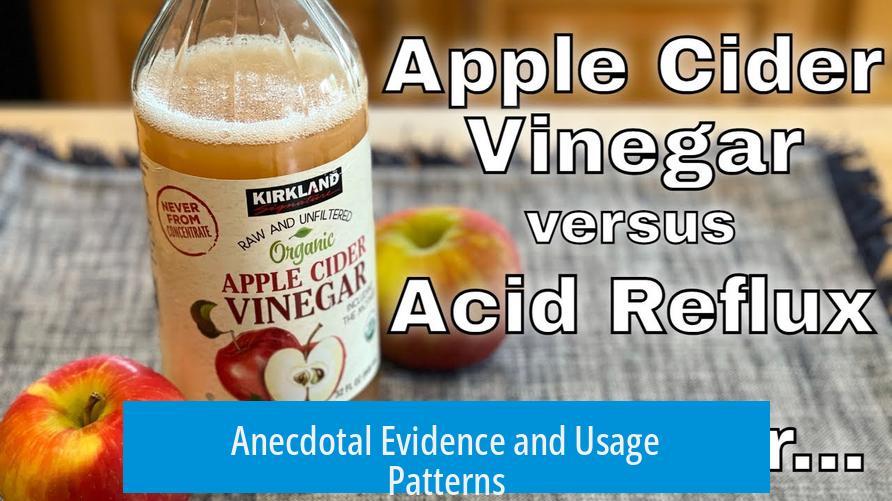
Many individuals with acid reflux report relief from taking apple cider vinegar. The common approach involves diluting ACV in water and consuming small amounts before meals or at bedtime.
- Typical doses range between 1 to 2 teaspoons (about 5-10 mL), diluted in a large glass of water.
- Some users gradually increase to 1 tablespoon to improve efficacy.
- ACV capsules offer an alternative for those who dislike the taste of vinegar.
While some remain skeptical and attribute effects to placebo, the consistent positive experiences suggest ACV affects the underlying physiology of acid reflux.
“A small shot of straight apple cider vinegar does actually seem to do the best job of totally arresting the symptoms of acid reflux for the entire night,” says one longtime user.
Cautions and Considerations
Despite reported benefits, it is important to use apple cider vinegar carefully:
- Undiluted vinegar can cause throat or stomach irritation.
- Overuse may harm tooth enamel or the digestive tract lining.
- ACV is not a substitute for medical treatment for severe GERD.
- Some patients may experience brief burning sensations upon first use.
Health professionals emphasize identifying and avoiding individual food triggers (e.g., caffeine, carbonated drinks, tomatoes) alongside other lifestyle modifications.
Combining Apple Cider Vinegar with Medical Treatments
Some individuals use ACV alongside medications such as pantoprazole, a proton pump inhibitor. While medications reduce acid production, ACV helps regulate the acidity balance. Any combination should be discussed with a healthcare provider.
It is critical to monitor symptom changes and avoid excessive reliance on any single remedy.
Summary

- Low stomach acidity can weaken the sphincter valve, causing acid reflux. Apple cider vinegar supplies acid to stimulate proper valve function.
- ACV forms a natural buffer system, stabilizing stomach pH and preventing rebound acid production common with antacids.
- ACV and similar acids become alkaline after ingestion, helping restore acid-base balance in the stomach.
- Anecdotal evidence supports ACV’s effectiveness; typical doses are 1–2 tsp diluted before meals.
- Use caution: avoid undiluted vinegar and consult a doctor, especially with chronic or severe reflux.
- Identify personal reflux triggers and consider combined strategies including medication and lifestyle changes.
Why Does Apple Cider Vinegar Help With Acid Reflux?
Apple cider vinegar (ACV) can help with acid reflux because it boosts acidity in the stomach, which in turn signals the sphincter valve to close, preventing stomach acid from flowing back into the esophagus.
Seems a bit backward, right? You might expect acid reflux to improve by cutting down on acid—not adding more. So why does adding vinegar, an acid itself, seem to calm heartburn? Let’s unpack this puzzle step-by-step, with facts, science, and some intriguing personal stories.
The Sphincter Valve: The Gatekeeper of Your Gut
Between your stomach and esophagus sits a tiny but powerful muscle called the lower esophageal sphincter (LES). Think of it as a one-way gate, designed to keep stomach contents from escaping upwards.
Now, here’s the catch: the LES depends on the acidity level in your stomach to work properly. When stomach acid is low—often due to overusing antacids—the LES may not get the signal to tighten. As a result, it can stay loose, allowing acid and food to squish back into your esophagus. And that burning sensation? That’s reflux.
This is where ACV comes in. By introducing more acid—acetic acid specifically—apple cider vinegar prompts the LES to close tightly. Essentially, it tweets the LES: “Hey, shut the door!”
Apple Cider Vinegar and Stomach Acidity: A Balancing Act
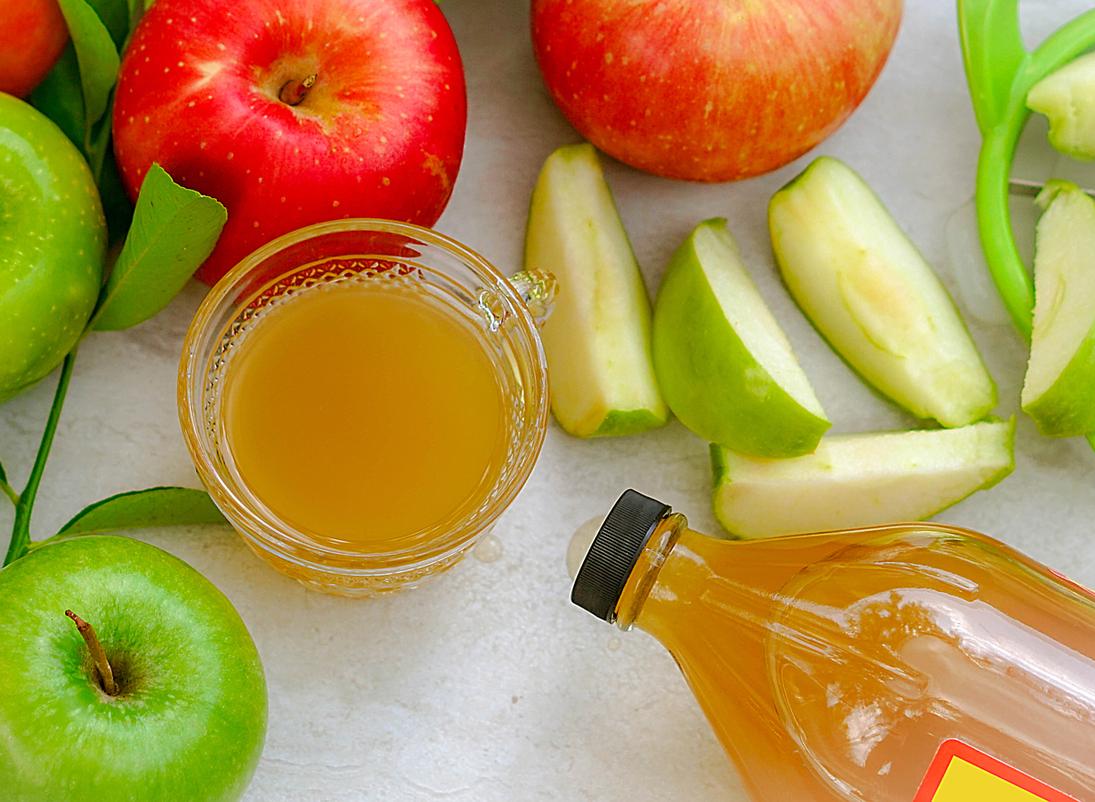
Antacids like calcium carbonate work by neutralizing stomach acid. Great, but this is only temporary. Neutralizing the acid makes your stomach sense “Not enough acid here!” and prompts it to pump out more acid later, leading back to square one, or rather, back to burning.
Unlike antacids, the acetic acid in ACV does not neutralize stomach acid immediately. Instead, it acts as a kind of buffer—a chemical system that keeps acidity within a healthy range. This happens because acetic acid slightly raises the pH by reacting with hydrochloric acid (HCl) already in the stomach, nudging the environment back toward normal.
Here’s the amazing part: though ACV is acidic outside the body, once ingested, it can *turn alkaline* during digestion. This paradox helps soothe the stomach lining and reduces that uncomfortable burning feeling.
Anecdotes That Make You Think Twice
Many who live with GERD (gastroesophageal reflux disease) swear by apple cider vinegar. One user with debilitating symptoms said nothing else helped—no meds, no change in diet—except for a shot of undiluted ACV. The relief reportedly came almost instantly, lasting through the night.
Others prefer a gentler approach. One person recommends diluting 1 to 2 teaspoons of ACV in a large glass of water before meals or at bedtime. The idea is simple: don’t overload your system. More vinegar does not equal more relief. Patience and moderation are the keywords here.
Capsules are another option. For those who wince at the taste (who doesn’t?), ACV supplements are available and can offer the same benefits without puckering your face.
Is It Placebo or Magic?
Not everyone buys into the ACV hype. Some say the effects might just be in the mind. “Better to chew on Tums,” one skeptic quips, suggesting vinegar won’t hold a candle to traditional antacids.
But if this is a placebo effect, then it’s one heck of a placebo. The consistent reports of relief, combined with the logical mechanism, suggest there is more going on here than wishful thinking.
Proceed With Caution: When to Think Twice
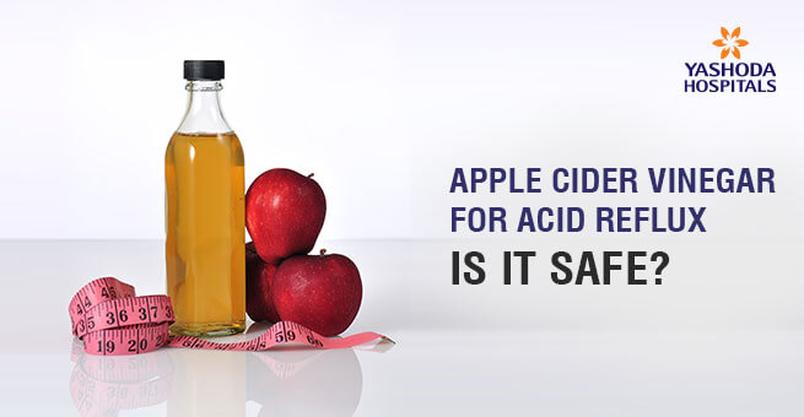
Before you start chugging vinegar like it’s a miracle cure, remember vinegar is acid, and too much acid is no picnic either. Regular, excessive consumption could damage tooth enamel, irritate the throat, or upset your stomach lining.
And for those with severe reflux or esophageal damage, vinegar might cause an initial sharp burn. One user described feeling like their chest “burnt like [expletive] for a second” after ingesting ACV, followed by,”it’s completely gone!” That’s a moment worth noting—some discomfort upfront for lasting relief.
Moreover, acid reflux triggers vary widely. Some can blame caffeine, sparkling drinks, tomatoes, or even motion sickness (boats and ferries were listed as culprits). Tackling lifestyle factors is crucial and should go hand-in-hand with any remedy.
Combining Treatments for Best Results
For many with persistent acid reflux, apple cider vinegar is not a standalone hero but part of a broader management plan. One person took daily pantoprazole pills alongside ACV, noting their pills worked well until COVID-19 weakened their effect.
The key takeaway? A thoughtful approach combining diet, medication, and natural remedies often yields the best outcome.
Practical Tip: How to Use ACV Safely for Acid Reflux
- Start small: Begin with 1 teaspoon diluted in a large glass of water.
- Take ACV before meals to stimulate stomach acid production and trigger the LES.
- Don’t drink ACV straight; always dilute it to protect your teeth and throat.
- Consider ACV capsules if the taste bothers you.
- Pair ACV usage with avoiding known triggers like caffeine or acidic foods.
In Summary: The Acid That calms the Fire
Apple cider vinegar helps acid reflux primarily by restoring the correct acidity in your stomach, which instructs the sphincter valve to stay closed, blocking reflux. The acetic acid acts as a buffer, balancing stomach pH rather than just neutralizing acid like antacids. Once ingested, ACV’s acidity transforms into an alkaline effect, which calms symptoms. Many users report significant relief, sometimes surpassing over-the-counter medications. Caution is advised regarding dosage and possible irritation, but diluted ACV can be a valuable tool against the discomfort of acid reflux.
Ultimately, while research is ongoing, the combination of biochemical insight and heartfelt testimonials makes apple cider vinegar an intriguing option. It begs the question: might a simple bottle in your pantry be the key to silencing the fiery beast of heartburn?
Why does apple cider vinegar help close the sphincter valve that causes acid reflux?
The sphincter valve between the stomach and esophagus stays shut when acidity is present. Low stomach acid can cause it to loosen. Apple cider vinegar adds acidity, helping the valve stay closed and preventing acid from rising up.
How does apple cider vinegar affect stomach acid compared to antacids?
Antacids neutralize stomach acid temporarily, causing the body to produce more acid later. Apple cider vinegar is acidic and may signal the stomach to reduce its own acid production, helping balance acidity longer.
Why does apple cider vinegar turn from acidic to alkaline after ingestion?
Once ingested, the acetic acid in vinegar interacts with stomach chemicals, acting as a buffer. This process can raise stomach pH to normal levels, so vinegar behaves more alkaline inside the body.
Is there scientific proof that apple cider vinegar actually treats acid reflux?
There is limited research proving effectiveness. Many reports are anecdotal. Some users feel relief, but placebo effects cannot be ruled out. More studies are needed for clear conclusions.
How should apple cider vinegar be used safely for acid reflux?
Use small doses like one to two teaspoons diluted in water before meals. Avoid raw vinegar to protect the throat and teeth. Some prefer vinegar capsules for easier intake over liquid form.


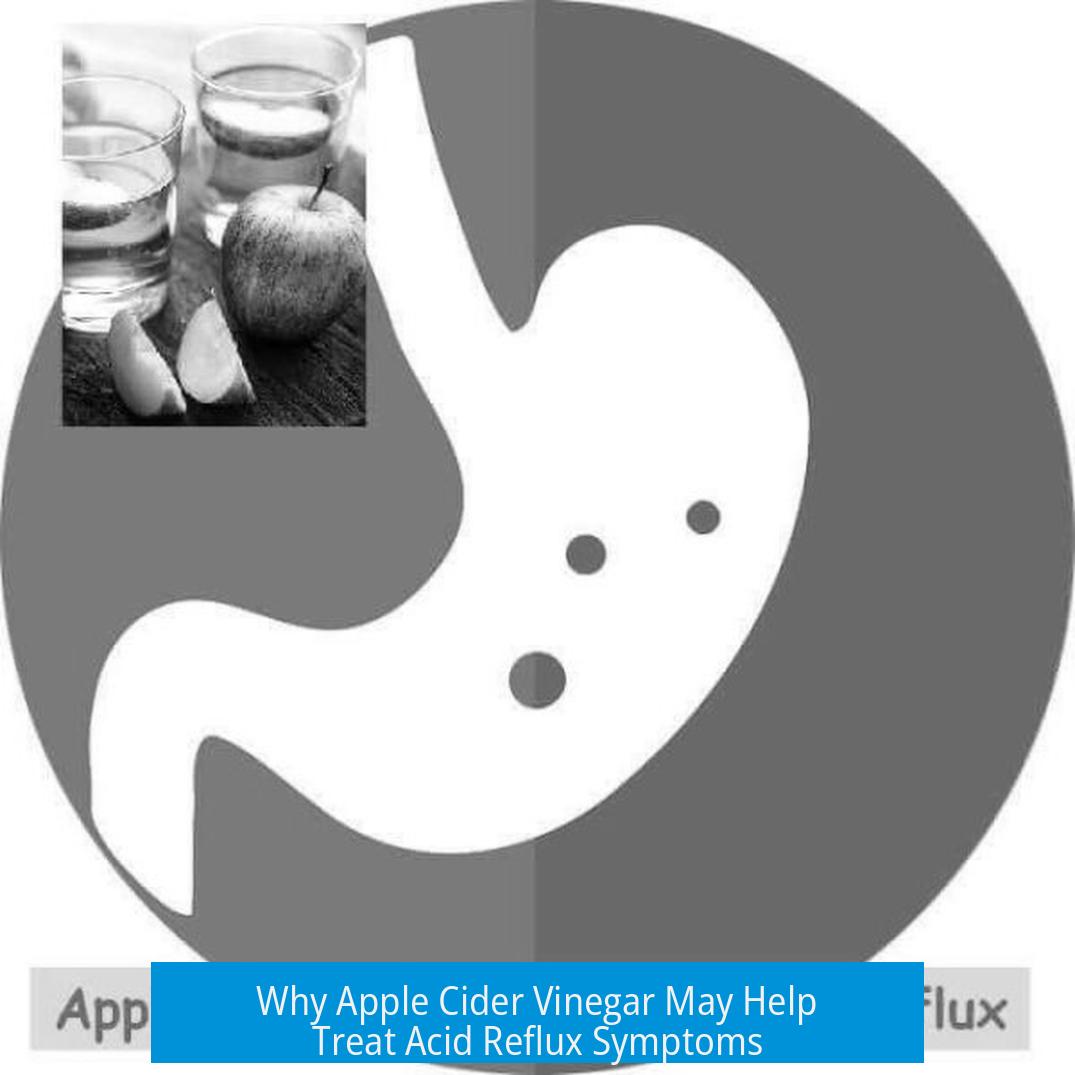

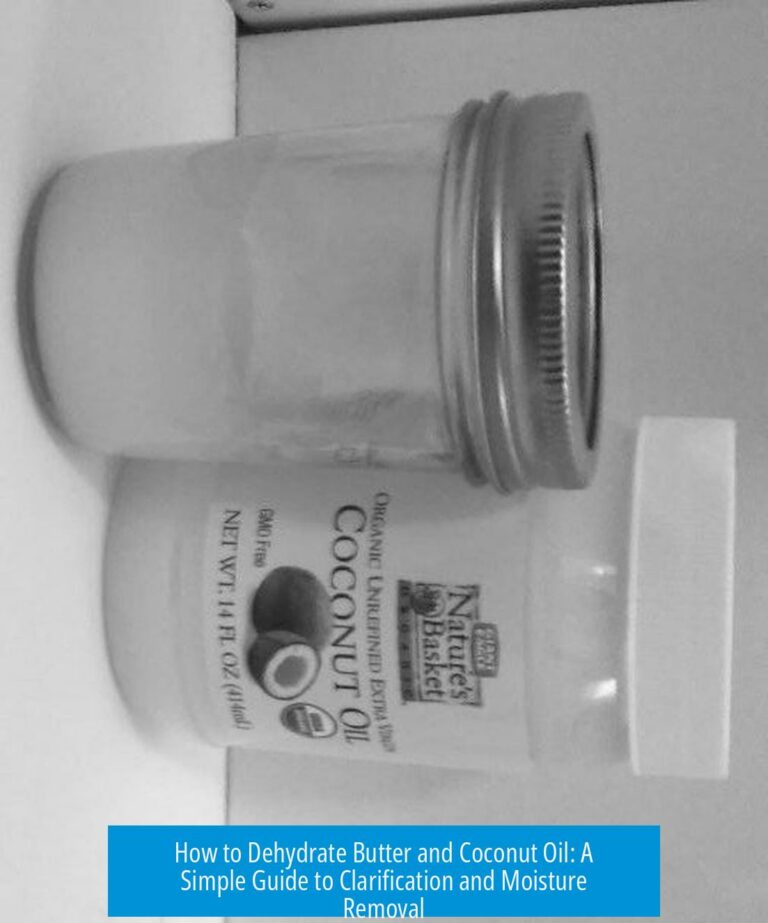
Leave a Comment